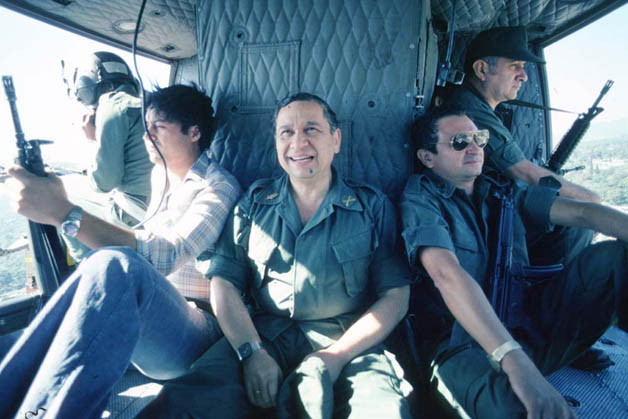
CJA has pursued Salvadoran human rights litigation since our founding in 1998, when we generated a “most wanted list” of Salvadoran human rights violators named in the UN-sponsored Truth Commission and reported to be in present in the United States.
In May 1999, CJA, alongside co-counsel Morrison & Foerster, filed a civil lawsuit in the U.S. District Court for the Southern District of Florida against two of the most notorious perpetrators on that list: Jose Guillermo García, the former minister of defense of El Salvador from 1979 to 1983, and Carlos Eugenio Vides Casanova, the former director general of El Salvador’s National Guard during the same period. Vides Casanova also served as minister of defense during a later period. Both defendants “retired” to the United States in August 1989.
Three years later, on July 23, 2002, following a four-week trial, a federal jury in West Palm Beach returned a verdict of $54.6 million against García and Vides Casanova. The verdict was a landmark victory for human rights litigation in the United States. It was one of the first instances in which a jury in a fully contested trial found perpetrators liable for human rights abuses solely under the doctrine of command responsibility.
The defendants appealed the verdict and, in February 2005, the Eleventh Circuit Court of Appeals overturned CJA’s victory in the case. The court ruled that the plaintiffs failed to state a cause of action within the 10-year statute of limitations applicable to the TVPA. However, in June of that same year, the Eleventh Circuit acknowledged certain factual errors in its prior ruling: the court had failed to consider that Vides Casanova had left power in El Salvador in May 1989, and that therefore CJA’s May 1999 filing occurred just before the end of the 10-year mark statute of limitations period.
On January 5, 2006, the 11th Circuit issued a new ruling upholding the verdict in its entirety: thus, the jury’s verdict against the two defendants remained valid. The court’s opinion reached two important conclusions on the question of equitable tolling in claims brought under the Alien Tort Statute (ATS). Equitable tolling is a legal doctrine that allows for the extending of statutes of limitations, when a deliberate act of the defendant, or an extraordinary circumstance prevented the plaintiff from filing the lawsuit within the applicable statute of limitations period.
In July 2006, Vides Casanova was forced to relinquish over $300,000 of his own funds. This collection represents one of the first human rights cases in U.S. history in which victims have recovered money from those found responsible for human rights abuses. Our heroic clients have donated almost all of the proceeds to charity.
